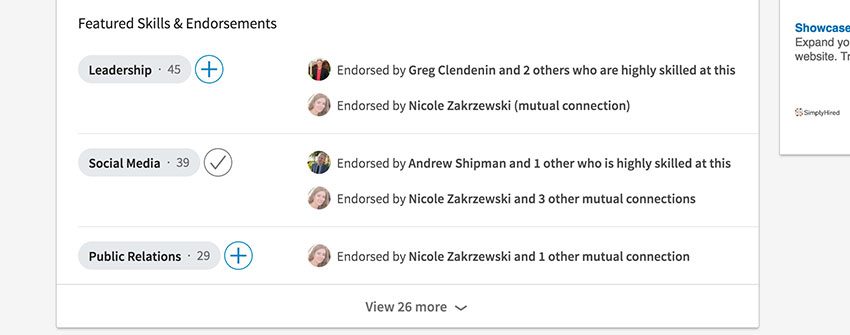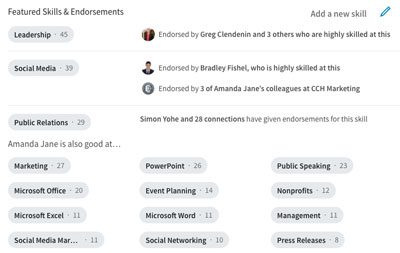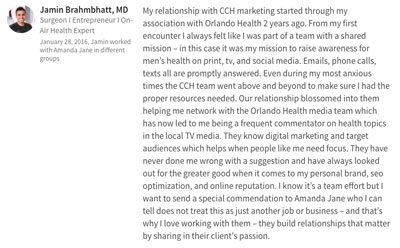news

THE LINKEDIN SOCIAL MEDIA ENDORSEMENT IS MISLEADING – AND HERE’S WHY
Recent Statista research found that 78% of Americans had at least one social media profile in 2016– up 5% from 2015. Brandwatch found that the average Internet user has approximately 5-6 social media accounts. Popular uses include staying in touch with friends, getting news, and filling up time. So when you’re setting up your LinkedIn, it may seem like a natural fit to choose “Social Media” as one of your skills because you’ve had an account for as long as you can remember. Naturally you know your way around the most popular platforms.
But you know what?
Let’s say that you do use social media for business purposes. Of the 40 million active small business pages on Facebook, only 2 million of those pay for advertising. 391 million Twitter accounts have no followers at all, and only 9% of US small businesses use YouTube. 96% of those who discuss a brand online don’t actually follow the account of the brand they’re discussing.

Reading between the lines of the statistics above indicate that if you aren’t specifically trained in social media optimization, you are missing out on the majority of what the platform has to offer. Here’s why
First, the front-end consumer interface looks nothing like what an admin panel looks like. And even if you’re an administrator, if you’re not launching paid campaigns– as the 38 million small businesses mentioned above are not– then you’re most likely not using the ads module, paid analytics features, and boost post option of Facebook alone (let alone Twitter ads, launching a sponsored Instagram post, a promoted Pin, or the like).
Second, there are strategies and best practices to building a successful social media brand. This includes using cards on Twitter, formatting your images to each platform, capitalizing on keywords and tagging. Little things make a difference, but the little things are big issues when you leave them out. I remind myself of this all the time. A successful strategy means taking a Twitter account with no followers and building it. That strategy means utilizing YouTube for a business, and encouraging the people who are already discussing your brand online to actually follow and engage with it.
Third, social media is not free. It is a pay-to-play marketplace, and very few individuals build lasting fame off of free social media success. You need to be knowledgeable about SEO optimization and aware when your campaigns are going awry. That’s not to mention the cost of designing a good social media campaign in the first place, and making sure it’s formatted to every platform. A paid campaign is worthless if you can’t even see it in the platform.

Fourth, using social media for personal reasons is not the same thing as embodying a brand voice across multiple platforms, which you often must juggle simultaneously. I don’t know of many recreational users who have live-streamed, live Tweeted, Instagrammed, and taken photos for posterity’s sake all at once. When you are a social media professional, editorial calendars, hex codes and branded fonts become par for the course.
You turn down photos in which the people in the background don’t look good and memorize which client wants the date written out which way. There is no more “I like this photo, I’m posting it!” Nope, everything is scheduled.
Additionally, a social media brand manager must be capable of handling the brand at all times. This includes maintaining brand confidentiality on a device that is glued to your side 24/7 that toggles between your accounts and your clients. It also means that your posts must never wind up on your brand’s account, and that in the event of a crisis, you are available to your client should they need social media support.
As we say in the office, it is far less expensive to hire a professional than an amateur. It is woefully misleading for recruiters to be told via a resume or an endorsement section that someone without these experiences is trained in social media. On a professional platform like LinkedIn, endorsements are considered a validation of your skills within the professional setting. Recruiters must be discerning enough to ask what social media management means to the person advertising their skills. It seems to me that unfortunately along the way, that perception has gotten lost when it comes to social media.
So tell me. Should I endorse you for social media?



